
We need to expand our team of proofreaders as we aim to increase the rate of republication of Satsvarūpa Mahārāja’s books as well as new books that he writes.
This includes a need for fluent bilingual Spanish and English speakers to proofread Spanish translations (we currently have around 20 Spanish translations waiting to be proofread).
Anyone interested in this particular service should contact Manohara dāsa at [email protected]
If you would like to help, please contact Kṛṣṇa-bhajana dāsa at [email protected] or [email protected] and we will find you a service that utilizes your talents.
PP. 60-63
Make some little improvements and build on them steadily. A lot of this may involve minor, personal habits. Someone, whenever he sits down, falls asleep when he chants. So it will be a big step for him if he doesn’t sit down anymore. Someone else discovers that if he eats too much at night, then he can’t chant in the morning, so he stops doing that. Little practical things like this will help improve your chanting. But the philosophy is there too. Be vigilant against offensive chanting.
******
It’s true that when there’s danger anyone who’s pious thinks right away of Krsna. But if the danger culminates in death, then death is such a violent shock to the spirit soul in the body that he’s more preoccupied with that condition. It’s not the best time to chant Hare Krsna. Although it is the most crucial time, the best condition we have is now.
******
Mercy means chanting Hare Krsna. Of course, this chantting is available to anyone, but it has to be done in disciplic succession. It has to be under the guidance of a spiritual master. This is declared in all the scriptures. The worship of the guru means to chant Hare Krsna under his instruction and to follow the regulative principles. This is the actual meaning of guru. To follow his instructions is the life and soul of the disciple. And what are those instructions? Chant Hare Krsna. Do not commit any more sinful activities. Your sinful activities are now removed by Krsna’s grace. Now don’t do anything else sinful, but spend your time serving Krsna with body, mind, and words. Chant Hare Kona and give your life to Lord Caitanya’s sankirtana movement. Therefore when we say that if you just follow these four rules and chant Hare Krsna sixteen rounds, and you go back to Godhead, that cannot be minimized. But it means you have to do it as all in all.
******
I was just thinking today about my beads. Someone said they were going to get me tulasi beads. And I was thinking, “But these beads have been chanted on by Prabhupada.” Then I thought, “But my beads are so worn out. The paint is worn off.” But what is more important in a devotee’s life than his beads, and that his spiritual master has chanted on them. The spiritual master who gave him Hare Krsna has also chanted on his beads. They are blessed. It’s a benediction. Just like mahaprasadam. Something used by the spiritual master is worshipable. So that’s the significance. And it’s something you can feel. We are appreciating that now. It’s fourteen years since he did it—he only did it once—but they become sacred. Not only has his spiritual master chanted on those beads but he’s asked him to chant nicely. So he should follow the instructions as he chants.
******
We have been given this human form of life with the tongue and the ear just suitable for chanting Hare Krsna. So try to concentrate on the sound when you chant. If it takes you a little more time to chant, then chant in the time that you need, and then later you can chant faster. But do not make a problem for the other devotees that you chant too long and cannot do any service.
******
A devotee who is trying to make up for his offensive chanting should offer prayers to the holy name. Also, he should specifically express regret that “I have not appreciated Krsna up to now, although He’s so glorious, so kind to come in His holy name. Now I am trying to understand His actual position, my actual position, and take shelter in the holy name.”
******
The Hare Krsna mantra has to be received from a spiritual master in the disciplic succession. Of course, anyone can pick up the mantra from a book or he can hear it and that is good and he can benefit in that way. But when one seriously wants to chant Hare Krsna to go back to home, back to Godhead in this lifetime, he has to receive the mantra in disciplic suc-cession. Just like Lord Brahma, he was the first living entity and he received the Hare Kma mantra from Lord Krma directly. And now in disciplic succession from Lord Brahma, we have to receive from the spiritual master. It cannot be just taken without a spiritual master or by some concoction as to who is the spiritual master.
******
Krsna likes to hear His name chanted. It is simply a natural thing. If a little child calls his father’s name, the father does not feel that out of humility he should not be pleased or that out of false ego he should become puffed up. Rather, it just touches his heart. Of course, I do not know what Krsna’s mind is or how He is pleased by the devotees. But I have given an example of how it works even in human affairs—that one likes to hear his name called by a lovable relative. At any rate, we should not only believe the hastra that Krsna likes to hear His name, but we should rejoice to know that we can please Kma in such an easy way.
pp. 195-200
My Dear Satsvarupa,
Please accept my blessings. I am in due receipt of your letter dated September 9th, 1969, addressed to the Hamburg center. Now I have come to England. Our temple here is not yet finished, so I am staying in the house of Mr. John Lennon. He is very much kind upon us. Here also there is a nice big hall, exactly suitable for a temple, and the devotees are enjoying the opportunity by chanting there twice, thrice daily. I have also begun to give lectures here on specific days, but there are no outsiders coming. I have arrived here on the 11th September at about 2:30, and the devotees arranged for a very nice reception in the airport. There was chanting, press interviews, and nice press reports have come out with excellent pictures. Some of them are enclosed herewith for your reference. The first meeting organized by the devotees here will be held in the Town Hall tomorrow in the evening. So let us see how we can establish Krishna Consciousness in this part of the world.
Regarding your judgment in court, it appears that the judge is a learned man, and he has given the right judgment, being graced by Krishna. We have to work sincerely, and because Krishna is in everyone’s heart, there will be no difficulty to have the necessary facilities. I hope by this time you have received the three Krishna tapes that were sent to you from Germany, and there will be more coming soon. I am enclosing a picture of the Los Angeles throne which Murari may hold as the standard for constructing the throne there. The throne should be 10 x 40 inches square, and 45 inches up to the canopy. Above that, up to the dome, it is another 12 inches. There should be three pillars as shown on the photograph, and they should be silver colored or silver-plated.
I am pleased that the press arrangement is proceeding nicely, and you will be pleased to know that my Guru Maharaja drew a picture in which He gave great importance to the symbolic representation of the press next to the mridunga. Press means publication of various types of books and literatures and the mridunga means Samkirtan Party. So now your center will have both facilities, and organize in such a way that you will become the living example to the other centers. When the press is fixed up, I shall go to Boston and see how things are being done personally. I hope you will accept this program.
Regarding the house, as you are consulting with lawyers, perhaps you can also take advice from Giriraj’s father, who is also a lawyer.
Please offer my blessings to the others. I hope this will meet you in good health.
Your ever well-wisher,
A.C. Bhaktivedanta Swami
P.S. I am in due receipt of Giriraj’s letter, sent along with $30 for the maintenance fund. Please thank him for this.
Although young people today have practically never heard of the Beatles, “Beatlemania” was a worldwide phenomenon in the 1960s and 1970s. Therefore, it was exciting to hear that Prabhupada was staying with John Lennon. The devotees in Los Angeles even circulated a pamphlet advertising that Prabhupada was giving bhakti-yoga lessons to the Beatles, although when Prabhupada saw it, he told them to withdraw it since it wasn’t true. He didn’t want the devotees to fabricate anything about his relationship with the Beatles.
We also received a tape in the mail—not a studio recording, but a kirtana in which George Harrison was leading the devotees. It was wonderful to have that tape. I remember telling the Sunday feast congregation—mostly young people—that Prabhupada was staying with the Beatles and as a special treat, I would play this tape of George Harrison leading kirtana. It was great to capture their interest with such news. They all listened as I played the tape and it was a hit.
Later we understood that Prabhupada didn’t like staying at John Lennon’s house. His comment, “No outsiders are coming,” is an indication that Prabhupada didn’t lose his bearings while he was staying there. He wasn’t overcome by their wealth or their fame. He also didn’t like to live with people who were engaged in such illicit activities, and he didn’t like their attitude toward the devotees. It seemed as if John Lennon was hiring them to work. They gave Prabhupada the servant’s quarters, which were not the best accommodations, instead of a place in the main house. Eventually, the devotees managed to prepare their new temple at Bury Place and Prabhupada moved back to London.
Prabhupada accompanied his letter with clippings from the newspaper. He was obviously pleased with the reception he had received from the press, although the European press and the American press had a similar estimation of the devotees. Prabhupada saw such newspaper clippings as good preaching tools. When he had received his first big press coverage upon his arrival in San Francisco (“Swami in Hippie Land”), Prabhupada had instructed us to make a thousand copies for distribution. This time he arranged that himself, but he sent us one copy to relish just as a father would share his success with his children.
The newspaper clipping showed an unusually large photo of Prabhupada playing karatalas upon his arrival. Although the newspaper did such a large spread, however, there were no follow-up visits from the press. The article had some tongue-in-cheek humor, some sarcasm, a collection of mundane comments, and not much more. The only saving grace was that they had quoted some of the things he had said.
It was interesting to get this letter and to hear from Prabhupada about his attempt to preach in another part of the world. It sounded almost exotic to us because we were so caught up in our affairs in Boston. Our main meditation upon reading his letter was when he would come to Boston. We weren’t absorbed in the idea that Krsna consciousness should be spread all over the world, although we were aware that this was Prabhupada’s mission. We mostly concentrated on our own little corner of that mission. And we had just finished dealing with the court case. Prabhupada mentions in this letter that he thought the judge had made an intelligent decision. Then he says, “We have to work sincerely, and because Krishna is in everyone’s heart, there will be no difficulty to have the necessary facilities.”
pp. 27-29
Come and bow your head. Come and bow before your Lords. Ask for mercy. I won’t ask for freedom from death. Ask for a good death, where you are thinking of Krsna. Be surrounded by people who are chanting His names. What would it be like? Someone questioned me why I write so freely what comes to my mind. They said it might be inappropriate for Vrndavana. Vrndavana is the place of secrets and confidentiality. If Srimati Radharani sees my tendency to write down whatever is on my mind, She might withhold things from me, for fear I would blab them. But this is my standard strategy wherever I am. Why I should be less candid in Vrndavana? Wouldn’t Radharani and Krsna be pleased with me for honesty?
I was invited to two different places, but I am not going. I cannot spare the hours. Instead I stayed in my room. “Isn’t it like a prison,” he asked? Going out could be like going to prison, imprisoning my spirit. Then spend your time well. Read a few pages of The Nectar of Devotion. Write something to Krsna. Tell Him you love Him. Tell Him you admire Radha and want to worship Her. Tell Him you want to know what it means take shelter of Her. Maybe it means to go out and visit a project, visit a friend. I am receiving a good friend in a few minutes. Tell him what’s on your mind, that’s taking shelter of Radharani. Ask for his sympathy. You want friends to support you. He may challenge you and ask you, “Why don’t you go out and see the people and places?” No, he is the friend, he will see it your way. The sanny?sa minister wrote to me and said I don’t have to attend the guru-seminar. It is just for new gurus. He said I should take care of my health. Now that’s a good suggestion, but someone may say that you need more fresh air and exercise, you need to tear your muscles. Get out and mix and get strong. Don’t entrophy bent up in the chair. Make up your mind. I am just waiting for my friend.
Today we went out to Loi Bazar to pick up the Deity garments and choose jewelry. Unfortunately we do not have jewelry measurements for Gaura-Nitai. We are trying to get them from America. We are trying to get them from them and then go back to the mukutwalla. Sitting on the covered floor of the man’s shop, examining the outfits he made with the outfits he based it on. Paying with a wad of rupees from the wallet. He offers you a glass of juice and you refuse. Have to go on the three-wheel motor-rickshaw. Getting stuck on the ruts in the street and in auto-buffalo-bicycle-motorbike traffic.
My japa and writing has not been as good here as in my own bhajan kutir. I appreciate being in Vrndavana, but I am not making the most of it. I wish I could make words out of nothing. I wish I could come closer to Radha-Krsna without going to the lila-sthalis. When I go to the places, I do not get much closer, unless it is a special, “undesignated,” place, picked out by Bhurijana Prabhu. Krsna created out of His own self the way a spider creates a web out his saliva. (This example is given in Srimad-Bhagavatam.) So could I create words of devotion in a similar way, spun out of my own self? Yes, you have devotional feelings within yourself, and you just have to spin them out. Make then sincere. Say “Krsna, I love You.” It is true, my love for Krsna is dormant, lying within my heart; it is covered by the layers of obstacles of offenses (anarthas). Break free. Krsna and Radha, I love you both. I just want to be Your servant in the spiritual world. But you have to deserve, and then you can desire. You deserve by working for Krsna’s mission in the material world. Then you gain the right to play with Them in Goloka Vrndavana.
The amplified voice of the sadhu drifts from the distance. He is singing pretty well. The whining of the workman’s saw is unpleasant. Nearby, a bird is sounding a one-note song. Occasionally you hear a shout from a child. From next door I can hear voices of Narayana-kavaca and Caitanya Candrodaya. I cannot make out the words, but the sound of their speech is very clear. So it’s a sound-filled atmosphere. Still, I have my privacy sitting alone in the room. There is a photo of Radha-Syamasundara above my bed, and beneath that is the photo of Govardhana Silas. On another wall – an embroidered banner of black Krsna wearing a yellow dhoti sitting cross-legged and playing His flute.
If you reveal too confidential feelings about Srimati Radharani , She may be disinclined to reveal confidences to you. But I have to write something, and secrets are the best things. There are the things you hold most dear. You take your risks, thinking, “If I am sincere and purely motivated, Krsna will protect me. Radharani will be glad to hear me talk of my feelings for Her, and She will tell me more. She will speak in my heart.” Oh yeah, some practical things, like where you stash your money, should be kept secret, but not your heart’s desires and aspirations, not your finest feelings.
What is your biggest secret about Radharani ? That She is the “dearmost devotee of Krsna because She loves Him the most.” She speaks many cross words against Krsna, but in Her heart She holds no ill at all against Him but loves Him with Her entire being. She wishes that all souls could become devotees of the Lord.
pp. 56-60
I am listening to the KṚṢṆA book dictations by Prabhupāda, especially when I’m in the bathroom. Now I’m hearing how Kaṃsa is calling Kṛṣṇa to Mathūra for a wrestling match to kill Him, by the elephant or by the wrestlers. Kaṃsa told these plans to Akrūra, not knowing that Akrūra was not in favor of them. What else is there to say? Kaṃsa wanted to kill Vasudeva when Nārada told him, “Child Kṛṣṇa is the one who will kill you.” Nārada told him, “Why kill Vasudeva? It’s Kṛṣṇa you ought to try to kill.” But to ease his wrath, Kaṃsa arrested Vasudeva and Devakī and put them in iron chains. When I heard that, I was sorry that there is such a demon.
This is what’s going on as I hear it. Dear Lord, this is almost the end of the 20th century, and people don’t believe much in religions. They don’t believe the Śrīmad-Bhāgavatam was spoken 5,000 years ago. I get tired sometimes and I may doubt. I ask You to please give me the faith and the intelligence to combat these ignorant doubts. I want to be a fighter, a preacher on Your behalf. Of course, I’d like to be able to write smashing, interesting books that people couldn’t put down. And these books would not be self-centered. I write like this because I don’t know anyone else. I read that the novelist Graham Greene did not write autobiography because he said it would have inevitably involved incursions into the privacy of other people’s lives. All right, but then he had to make up stories that weren’t true, and that seems even worse. So what I do is write actual life, my own, but I don’t tell about other people. That makes it look self-centered. Another thing I try is to not live much with people. But still they are on the mind. You might consider doing what Graham Greene did, but that seems too demanding to me, to write those made-up stories. To become a kind of Lord Brahmā, creating imaginative lives and bodies and saying, “Bill was rather short. He had a dimple and creases around his eyes. He liked to make love to women, and he lusted over the cleaning lady who worked in his apartment building.” I can’t even write straight.
But why can’t you pay attention to hari-kathā? Well, what is there to do? It has already been done wonderfully by perfect sages. I can gather some of it, I guess. But if I’m committed to this kind of writing…the metaphor, Franz, the metaphor, or failing that, for me for now, the poem.
God it would be nice, it is already nice
to write like this. You can keep doing it
all day. It is your own endeavor.
The God who makes things happen
can sing in me. He is in my heart.
I am not the God. You are not either.
God is beyond us, He is especially
beyond you because you don’t read the
scriptures with faith. I am better
than you because I have a spiritual master,
the great swami whom you refuse to accept.
So I am better than you
but you don’t know it and
neither should I say it.
Actually, I am not better than you.
I’m trying to form myself
to be like a Vaiṣṇava.
Do you know what that is?
Even the ambassador from India to the U.S.
knows it, he is from Bengal. I read
about him in ISKCON World Review and
I’m sick of the hype and ads and hoopla.
But I’m not better than any one of you.
Still, I am sick of it and
that is why I can’t write today so well.
But still there may be a grand metaphor
lurking and come out in my subconscious.
Robert Louis Stevenson said
several of his best stories just came to him
in his dreams, including Dr. Jekyll and
Mr.Hyde.
He just dreamed them and wrote
them down.
Lucky, huh?
I don’t mind working, I just don’t like you
putting me down, saying I don’t work
the craft, don’t rewrite, just ramble.
That’s why I’m establishing that
I am better than you.
It’s silly. I am who I am and you
are you. We are both followers of the Swami
and as for the others,
well,
they are for us to preach to.
That’s the challenge.
The most important thing is God consciousness. The world is so empty of it. I started to read Volume Three of Hariśauri’s Diary. Śrīla Prabhupāda was talking in the car as they drove from Pittsburgh to New Vrindaban. He said if one-fourth of the population could become Kṛṣṇa conscious… But is it growing? I need him here to tell us if it is going okay. I don’t listen to ISKCON’s severe critics, or maybe I do through the back door. But no one can assure me the way he did. I work despite any doubts. But you wonder. There are hundreds of devotees in Russia, but what does it amount to? Does the country get any better? Does it offset Kali-yuga?
Prabhupāda says the chanting of Hare Kṛṣṇa can transform the world. I am disappointed that I don’t have the gumption or vision to go on chanting more and more. You can drink a tea and sit at the form and talk with M. about prayer … but when it comes down to chanting, you can’t keep going when there is such absence of feeling and taste. That’s natural for a human, I guess. How can you plow ahead without taste or some sense of contrition, something, not just the mechanical numbers? So I turn to reading, where there is at least a sense of interest and filling up. Forgive me, holy name, I will chant again of course, more … But this November-December, I did want to read more. It will immediately help this writing. Maybe the reading will supply the metaphor.
pp. 105-7
One evening I was sitting in the storefront waiting for the Swami to come in and begin. Allen Ginsberg walked in. He was a great celebrity, and we were all alert to the fact. He sat behind me and asked. “What’s going to happen?”
I said, “Pretty soon the Swami will come in and then we’ll start the kirtana. We do that for about twenty minutes, and then he talks.”
I was aware that my words did not express the reverence that I actually had towards the scene that was about to take place. If I were to express my heart, I would have said, “The Swami is a pure devotee of the Lord. He is going to lead us in a sacred chant which can purify us and make us understand we are spirit souls. When he speaks, it may be a little difficult to understand at first, but what he is teaching is better than any speculative philosophy or literature.”
I had tried to give Mr. Ginsberg a light description of the Swami’s entrance. We wanted him to think that we were hip, not like churchgoers who speak in solemn tones.
After I replied to Allen Ginsberg, I turned back to myself. It was a rare opportunity for an aspiring poet to talk to the dean of American beat poets, but I did not want to talk to him. I wanted to get back into my reverent mood. I felt ashamed of that touch of frivolousness in my description of Prabhupada. I breathed in deeply and then let it out. I took another deep breath and let it out. I told myself, “Get back into yourself, man. Don’t play a grandstand for Allen Ginsberg. You’re for the Swami, not for him.”
I remember another early irreverence. After my first or second visit to the storefront, I wrote a letter to my college professor, Dr. Alexander, who was in Europe for the summer. “There’s a swami on the Lower East Side and I have gone now to two meetings. Last night a boy got up and danced. Who knows what will happen next?” I treated it as a humorous occasion. I was reporting on the happenings on the Lower East Side. My professor wrote me back. “Your letter was gingery.”
Sometimes bombs exploded from the unconscious. Often it was during kirtana. You reacted by throwing them off, and throwing yourself further into the kirtana.
“Pay attention, you’re way out of line. Hear the name of Krsna.”
Suddenly you had an urge to leave Krsria con-sciousness. “I don’t believe this! There’s no God!” And desires for illicit sex. When the bombs went off you looked to Swamiji with earnestness. “I don’t want this old life anymore; I want what you have. I want the pure life of Krsna.”
During the kirtanas I faced the truth: “I am unhappy. Even if Murray and Steve and I are on the cutting edge of a new literary movement in America, what good is it if it doesn’t make me happy? Maybe I’ll find the girl of my dreams, but it doesn’t seem so. Life is stark. I am so dependent on marijuana. The lives of the welfare clients … I want to get out of this.”
Sometimes the bombs were temptations: “I am young and hip. I am free from my parents and free from the Navy. I can do what I want, get high every day!”
So the bombs worked against the Swami and faith in his process. When they hit, you turned to him and called the name of Krsrja. Then everything would be all right.
Prabhupada sat down and began singing. Hayagriva with his full beard and checkered shirt was hitting the big cymbal with the drumstick. Swamiji accepted it.
With rough and ready hands (clap-clap-clap), we were like a group of peasants stomping their feet. Our sleeves were rolled up. Young men clapping as Swamiji sang the bhajana. The boys played off each other’s voices, so we wouldn’t get bored. The main thing, though, is to hear when the Swami sings. Then you sing.
Look over at the others. Look at their faces moving back and forward with eyes closed. Look up at the Swami. Each one is into his own experience, but you are all together. You are not long-time friends, but there is a bond.
This thick-bodied clapping keeps the kirtana solid. It helps concentration; it is what Swamiji invites.
The kids are at the door. Trucks grinding gears. We are bunched at the Swamiji’s feet in that one part of the universe, drawing from the kirtana that he is giving—and they can’t get at us now. Hare Krsna, Hare Krsna, Krsna Krsna, Hare Hare/Hare Rama, Hare Rama, Rama Rama, Hare Hare.
pp. 59-65
Modern poets have found almost-complete poems in unlikely places, such as newspaper articles, a child’s talking, a piece of prose by a serious writer, or the speaking of an exceptional person. For example, in 1935, W.B. Yeats, while editing the Oxford Book of Modern Verse, reprinted Pater’s paragraph on Mona Lisa, rearranging it to look like vers libre. In a recent book, the American poet Jane Cooper, describes her poem Inheritances as “almost verbatim from Herter Norton’s translation of Rilke’s The Notebooks of Malte Laurids Brigge.” And Joel Oppenheimer, in Poetry, the Ecology of the Soul, describes his “found” poem, At Fifty, as follows: “It is word for word (from a newspaper clipping); with a possible alteration in some of the punctuation where it may have been broken into separate sentences while I’ve made it a list. But I have not changed any words, any meanings.”
In such poems, the poet acts mostly as an editor, discovering art in an unusual context. By sensitively placing his discovery in the format of a poem he gives us—if he is successful—a fresh and valid expression. This is not the same thing as “versifying,” which implies a change in words and meter, and where the new work often becomes something entirely different from the original inspiration.
Devotees who have regularly listened to Prabhupada’s speeches have often remarked that Prabhupada is a wonderful speaker. Although he always repeats what he has heard from previous acaryas, his expressions are original and poetic. When we tune into Prabhupada’s speech and when we take excerpts from it, as I have often done, we find complete poetic statements. The poems that I have “discovered” here are left almost just as he spoke them. In some cases I have skipped from one part of his lecture to another and brought the sentences together without using the ellipsis points. Occasionally I have changed a word. But this is Prabhupada almost verbatim, in free-verse form. Although the method of discovery may seem easy enough, I went through many lectures, and selected only what I felt was the most striking and presentable. I hope that it will be pleasing to his followers.
(Srimad Bhagavatam 7.9.12m Montreal,
August 1968)
God is God, always God!
Just like Krsna,
in the womb of His mother, He’s God,
in the lap of His mother, He’s God,
while He’s playing with His boyfriends
as cowherd boy, He’s God,
while He’s dancing with His girlfriends,
He’s God,
while He’s fighting in Kuruksetra,
He’s God,
while He’s married, He’s God,
while He’s speaking, He’s God,
that is God.
He’s the origin of Brahma, He’s
the fountainhead of Siva, He’s
the fountainhead of Visnu,
therefore He’s the origin.
So our prayer should be to
the Supreme Person,
Govindam adi-purusam
tam aham bhajami
We are going alone.
This is retirement.
Without waiting for anyone.
Alone, simply depending on Krsna.
This is the process of renouncement.
Not to make arrangement in the family,
“Now I am retiring.
You send me money
and I shall maintain myself.”
No. No dependence,
simply depend on Krsna.
Therefore it is said, eka matir apa:
actually Krsna saves us.
So why should we depend on others?
December 9, 1968
By Krsna’s arrangement
we came in contact,
‘tho I was born in one family,
and my Guru Maharaja
was born somewhere else.
Who knew
that I would come
to his protection?
Who knew
that I would come to America?
Who knew
that you American boys will come to me?
These are all Krsna’s arrangements.
We cannot understand
how these things are taking place.
January 5, 1973
Krsna goes every day to the
forest of Vrndavana and
there some demon comes and
the cowherd boys say,
“There is Krsna,
we don’t care
for this demon.”
And the demon is killed.
And they come home
and narrate the story:
“Oh, my dear mother,
Krsna did this wonderful thing.”
The mother is also
very appreciative:
“Oh, how our Krsna is so nice.
He can do wonderful.
He must be some demigod.”
Like that, gossiping.
So actually this is life,
this Vrndavana is actual life.
January 5, 1973
What is this life, working so hard day
and night, discovering so many
things! Don’t you know, as soon as
the water supply is stopped everything
stops?
The electricity will stop,
the electric train will stop,
the lift will stop, the light will stop.
And there will be havoc.
So this artificial life
is not actual life.
There will be a time
when for hundreds of years
there will be no rain.
You have to wait for that time.
That time is coming at
the end of Kali-yuga
when for hundreds of years
there will be no rain.
Everything on earth
will be burned into ashes.
Then the sunshine will be twelve times hottcr.
This is stated in the Bhagavatam.
Everything will be burned into ashes.
And then there will be torrents of rain.
These descriptions are there.
Radhastami 1968
Don’t take Radharani
as an ordinary woman
like your wife or sister.
She’s the pleasure potency!
And the birth of Radharani
was not from the womb
of any human being.
She was found by Her father
in the field while he was plowing;
he saw one little, nice child
and he had no children
so he caught it
and presented to the queen:
“Oh, here we have got
a very nice child.”
“How you got?”
“In the field. Just see.”
Radharani’s janma is like that.
pp. 146-149
Thereupon that man who spoke on different subjects with thousands of meanings and who fought on thousands of battlefields and protected thousands of men, stopped speaking and, being completely freed from all bondage, withdrew his mind from everything else and fixed his wide-open eyes upon the original Personality of Godhead, Sri Krsna, who stood before him, four-handed, dressed in yellow garments that glittered and shined.
By pure meditation, looking at Lord Sri Krsna, he at once was freed from all material inauspiciousness and was relieved of all bodily pains caused by the arrow wounds. Thus all the external activities of his senses at once stopped, and he prayed transcendentally to the controller of all living beings while quitting his material body.
—Srimad-Bhagavatam 1.9.30-31
I set the alarm clock to go off at 1:30 A.M. I wanted to rise early enough so that I could spend an hour or so for writing my essay before attending the morning program in the temple. But just before 1:30, I awoke on my own and turned off the alarm. The room was cold and my sleeping bag was warm inside. The house was completely quiet. All right, I thought, it’s time to get up. But my mind wanted to discuss it further. “You can do it later. You’re very tired. Didn’t you wake during the night?” I replied to my mind that I wanted to rise now without delay, because I really should try to produce as much as I can in this lifetime. I’m not getting any younger; maybe two-thirds of my life is already finished. But then I dozed. When I woke again and glanced at the clock, it was 1:45 A.M. I sat up quickly. I put my head to the floor and offered a prayer. Then I reached for my flashlight. Bare feet touched the cold floor. I soaked a tissue in water and dabbed at my eyes. I turned on the light. Now the mind could only grumble, but with little effect on my determination.
I was sorry that I had dozed for fifteen minutes. That meant I had already lost one-fourth of my special opportunity, but by Krsna’s grace I could make it up. And so I sat at the desk and began working from where I had left off the day before. After an hour of writing, I felt that I had gained something that could not be taken away, even by the ravages of time.
Readers may consider that the above memory hardly qualifies as a “near-death” experience. It is certainly not what the psychologists go for when they conduct near-death interviews. They want to talk with someone who just barely survived a car accident or drowning or something like that. My experience, mild as it appears, would also not be of interest to the editors of men’s adventure magazines which describe sensational encounters with death: “There I was, less than a foot away from death …. Either I would plunge over the waterfalls, or I would be crushed to death in the arms of the giant grizzly bear!” And yet my attempt at an early rising—as well as similar episodes which everyone experiences daily—is actually a grappling with death. For many of us, it is mainly in little ways that we test ourselves and assert our desire to be Krsna conscious despite the inevitable course of time.
Bhismadeva was most extraordinary. His adventures were beyond all the mundane accounts of “dying and death” and outmatched even those found in sensational magazines. Bhisma is special because he was a very dear devotee of the Supreme Lord, Krsna. Bhisma is one of the twelve foremost authorities, or mahajanas, in Vedic history, and Lord Krsna personally appeared before him in his last hours. Bhisma lay on a bed of arrows which had pierced his body during encounters in the Kuruksetra war, and yet he chose the hour of his death. Just as a mystic yogi can choose the occasion of his departure from the world, so Bhisma was not dying due to expiration or pain, but by his own will. Furthermore, Bhisma spent his last hours speaking intricate and learned instructions in God consciousness. Despite his physical inconvenience, he brought relief to the mind of King Yudhisthira and others who had gathered before him. The passing away of Bhismadeva is recorded in Srimad-Bhagavatam so that we may know how a great soul departed from this world. Although we cannot imitate Bhisma, we can guide ourselves by his behavior, just as a navigator charts his way by an unerring star.
One time Srila Prabhupada said, “Krsna conscious philosophy means to keep death always in front of you.” It is also stated in the sastras, ante narayaria smrtih: “The goal of life is to remember Lord Nara-yana at the time of death.” As described in the Eighth Chapter of the Bhagavad-gita, “Whatever state of being one remembers when he quits his body, that state he will attain without fail.” The successful yogi or devotee who is able to remember God at the time of his death at once enters the eternal abode. Lord Krsna says, “Of this there is no doubt ….One who, at the time of death, fixes his life air between the eyebrows and in full devotion engages himself in remembering the Supreme Lord will certainly attain to the Supreme Personality of Godhead.”
Even an “ordinary” devotee of the Lord can capitalize on whatever realizations he does have in order to remain aware of death and to overcome it. But many of us will have to admit that our reali-zations on death are theoretical. We have heard that death will be “the final test.” But we do not know how well we will be able to rise to the occasion at that difficult time.
Don’t find excuses,
just rise from bed
as an offering to the Lord.
Decide not to mention
that cut on your thumb,
because life is short—
for praising Krsna.
Speak out
to thank him for the lunch.
Produce as much work as you can
and when Death comes,
humbly tell him “I thought
your men had orders
to punish only those who don’t
use their tongues to chant
the holy names of Krsna,
and whose hearts do not remember
the lotus feet of Krsna even once,
and whose heads do not
bow down before Lord Krsna. “
And then turn to the Lord,
as you do every day
to chant, remember, and
bow down, unafraid.
pp. 94-98
Srila Prabhupada and the Vedic sastras both stress sravanam, hearing. By hearing the word “milk,” one can immediately gain all the other qualities of milk which one could normally gain only through the other senses. This is the special potency of hearing. In the same way, by hearing about Krsna and devotional service, one can know Krsna and begin to serve Him. The Srimad-Bhagavatam states that “as that “As soon as one hears the message of the Bhagavatam, by culture of knowledge, the Supreme Lord is established in his heart.”
Although hearing includes reading, Vedic knowledge is traditionally received through the faculty of the ear. Prabhupada often used words like “submissive aural reception,” “ability to hear,” “sound vibration” and “receiving the message through the ear.” Prabhupada also stated in one purport that hearing is more important than thinking in this age because “one’s thinking may become disturbed by mental agitation, but if one is concentrated on hearing, he will be forced to associate with the sound vibration of Krsna.”
In America, Srila Prabhupada took great care to tape record himself. Prabhupada wrote a letter to Tirtha Maharaja describing this:
I may cite herewith one incident which happened yesterday evening. I have prepared some tape record of my personal kirtan. When one of this tape record was played the audience became practically charmed by that, although not a single word of my language was understandable by them. So, I am confident of the statement of Srila Haridas Thakur that the transcendental sound of Lord Caitanya’s harinam can do good even to the birds and the beasts.
Prabhupada saw the use of tape recorders as an example of Rupa Gosvami’s yukta-vairagya, using the material energy for the service of the Lord, although sometimes his early visitors doubted him for possessing such a “material” amenity as a tape recorder.
He often used the analogy of a tape recorder to explain Krsna and His separated material energy. The voice on the tape is simultaneously one with the person and yet different; it is the speaker but removed from him. In this way, we can appreciate that Srila Prabhupada is present in the absolute sense in his recorded speeches and bhajanas.
There are special advantages to hearing Prabhupada on tape. One can imbibe his preaching while engaged in other activities, such as taking prasadam or cooking. One can also become transported to the historical time and place where Prabhupada was speaking, hearing the same universal Krsna conscious philosophy he presents in his books, with the added benefit of hearing him apply it to time and circumstance. On the old tapes, you can hear the street noises of 2nd Avenue in the background; on the Vrndavana tapes, the peacocks. You can also hear Prabhupada’s conviction.
Sometimes devotees complain that they cannot understand Prabhupada’s thick Bengali-Scottish-English accent, or they become distracted by the various background noises. But one should really overcome these difficulties and hear Prabhupada preach. He actually speaks quite clearly, and one can come to relish his accent and phraseology.
Prabhupada himself stressed the importance of hearing from him. He did not consider it enough that his disciples had his books to read if he was available speaking personally. Even when he was speaking in Hindi, a language few of his disciples understood, he expected them to listen attentively. The sound vibration was purifying.
The Vedas also recommend constant and repeated hearing. The ears will hear something, and if not krsna-katha, then they will seek out the sound vibration of prajalpa.
The message should be heard attentively, and if spoken by a realized soul, it will act on the dormant heart of the conditioned soul. And by continuously hearing, one can attain the perfect stage of self-realization.
Srila Prabhupada did not lecture only for his disciples. He did it as preaching. Anywhere he went in the world, he gave lectures, pandal programs, or meetings in his room. Although he was present in his books, he made himself personally present to be heard. He also trained his disciples to lecture. Lecturing was one of his main ways to serve Krsna. After finishing one late-night preaching marathon, Prabhupada once remarked, “Keep me talking—that is my life. Don’t let me stop talking.”
The task of recording Srila Prabhupada’s speeches lacked central coordination until the BBT organized it in 1972, and even then, with changes of secretaries and equipment (and for the lack of technical expertise), the quality of the recordings varied. The original tapes are in a precarious condition, and the Bhaktivedanta Archives is converting all of them to a more technologically advanced tape-recording system. The Archives estimates that this will take five years and says that donations are needed. Its own fund-raising consists of printing and selling the Conversations With Śrīla Prabhupāda books.
The tape ministry was expanded in 1978 to its present size: 711 tapes of lectures and conversations, and 35 tapes of bhajanas. Many of the poorer quality tapes were never released, but now they are being published in the Conversations With Śrīla Prabhupāda books.
pp. 6-9
Dear Śrīla Prabhupāda,
Please accept my humble obeisances at your lotus feet. All glories to you.
It is crucial that I write letters to you. For me, it keeps our bond tight. And I am confident that you accept my words. Every morning when Baladeva takes off your night cap, I call out, “Prabhupāda!” I watch him give you the bead bag, pavitra and light daytime cādar. And then I turn to my service of writing. Please hear from me. You are my eternal father. You told me that in a letter. (You said my material father was ephemeral.) In this lifetime when I first met you, I found some obstacles within myself towards loving you. You said, “If you love me, then I’ll love you.” That statement opened my heart. I was already serving you by typing your manuscripts and donating from my welfare job. But that morning, when I turned in the latest manuscripts, you first said “This (service) is not mechanical.” And then you said, “If you love me …” That was fifty-seven years ago.
I am still serving you and loving you (in ISKCON). I knew you and loved you when you had only ten disciples, in a storefront at 26 Second Avenue. Externally it wasn’t much of a start. You had hardly enough money to pay the rent, and we didn’t do much outreach preaching in the first couple of years. But we had a lot of your personal association. We were like an intimate family, and every day in informal gatherings, or when you spoke from a dais in the temple room, speaking from the Bhagavad-gītā, you taught us about Sri Kṛṣṇa, the Supreme Personality of Godhead, and how to render devotional service to Him.
That was fifty-seven years ago. In your lifetime you saw the movement expand to a hundred centers all over the world, and you initiated some four thousand disciples. Millions of your books were distributed by your devotees.
After your disappearance, things continued to grow. But without your direct supervision, your followers, including the leaders (mostly handpicked by you), made big mistakes. They started a “zonal guru system,” which proved dysfunctional, and was dismantled only after eight years. Many cases of abuse of children took place over the years, and new cases are still being uncovered. A grass-roots movement has risen up proposing reforms, even in the GBC.
There are good signs too. Just weeks ago, three thousand devotees gathered in Dallas to enact a “Sādhu Sanga” festival of chanting, hearing, and honoring prasādam. Last week in New York City, Ratha-yātrā took place. The three chariots of Jagannātha, Subhadrā and Balarāma were taken down Fifth Avenue. Those who attended the Ratha-yātrā all emphasized how huge was the crowd of devotees. Very auspicious to see the growth of the Hare Kṛṣṇa movement. Again, Śrīla Prabhupāda, you were very pleased.
Śrīla Prabhupāda, I am old and invalid now. I cannot attend festivals or meetings of devotees. No one expects me to go to these things. My only services are writing (for you), hearing two-and-a-quarter hours from your books, correspondence, receiving visitors, taking darśana of my Deities, chanting japa, etc.
The movement is too big for me, but I cheer it on from the sidelines. Prabhupāda, please accept me despite my faults. Let me not find faults in devotees. I pray that Kṛṣṇa might protect me so I never find fault in you or lessen in my devotion to you.
* * * * *
Dear Lord Kṛṣṇa,
Please accept my humble obeisances at Your lotus feet. All glories to You!
Dear Lord, You are omnipotent and very sweet. The Vrajavāsīs prefer to love You in Your sweet form as Śyāmasundara (madhuraṁ, madhuraṁ, madhuraṁ, madhuram). And You prefer their spontaneous love over the worship with awe and reverence. You are bhakta-vatsala, especially inclined to Your devotees. I have been taught by my spiritual master that I should relate to You as bhakta-vatsala. Are You inclined even to me, a tiny fallen soul? Lord Caitanya is known as patita-pāvana, the one who saves the fallen. I have such a great spiritual master; he picked me up (along with thousands of others who were leading sinful lives). I have to follow, obey and be devoted to him (Śrīla Prabhupāda) in order for You to glance on me and take me back to Godhead.
I pray to You every morning in the Hare Kṛṣṇa mantra, sixteen or twenty rounds. You are nondifferent than Your holy name. Sometimes I am not so attentive. I think of what I may write after I finish chanting. Please spare me (I pray right now) from an obsession that places writing above chanting. And let my writing be done as a prayer in Your service.
I close this letter worshiping with the pen.
nama om viṣṇu-pādāya
kṛṣṇa preṣṭhāya bhū-tale
śrīmate bhaktivedānta
svāmin iti nāmineśrī kṛṣṇa caitanya, prabhu nityānanda, śrī advaita, gadādhara,
śrivāsādi-gaura-bhakta-vṛnda.With love,
Yours in the service of the service of the service of the service of my spiritual master, Śrīla Prabhupāda.
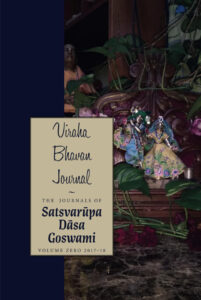
Viraha Bhavan Journal (2017–2018) was written by Satsvarūpa Mahārāja following a brief hiatus in writing activity, and was originally intended to be volume 1 in a series of published journals. However, following its completion and publication, Mahārāja again stopped writing books, subsequently focusing only on what became his current online journal, which began in August of 2018.
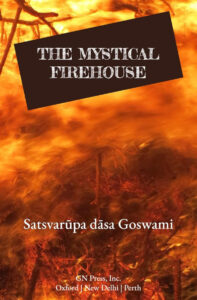
At first, I took it hard that I would have to live surrounded by the firemen, and without my own solitude. After all, for decades I had lived in my own house with my own books and my own friends. I was also now a crippled person who couldn’t walk, living among men who did active duties. But when Baladeva explained it to me, how it was not so bad living continually with other firemen and living in the firehouse with its limited facilities, I came to partially accept it and to accept the other men. I came to accept my new situation. I would live continually in the firehouse and mostly not go outside. I would not lead such a solitary life but associate with the other firemen.
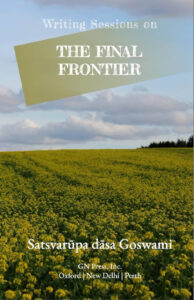
Let me write sweet prose.
Let me write not for my own benefit
but for the pleasure of Their Lordships.
Let me please Kṛṣṇa,
that’s my only wish.
May Kṛṣṇa be pleased with me,
that’s my only hope and desire.
May Kṛṣṇa give me His blessings:
Kṛṣṇa Kṛṣṇa Kṛṣṇa Kṛṣṇa Kṛṣṇa he
Rāma Rāghava Rāma Rāghava
Rāma Rāghava rakṣa mām.
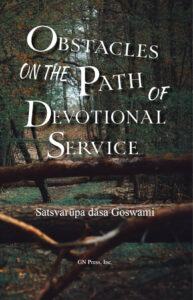
You mentioned that your pathway has become filled with stumbling blocks, but there are no stumbling blocks. I can kick out all those stumbling blocks immediately, provided you accept my guidance. With one stroke of my kick, I can kick out all stumbling blocks. —Letter by Śrīla Prabhupāda, December 9, 1972.
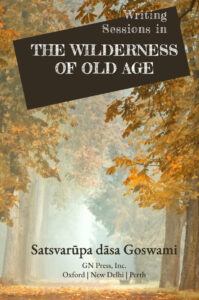
The Writing Sessions are my heart and soul. I’m trying my best to keep up with them. I am working with a few devotees, and they are far ahead of me. I wander in the wilderness of old age. I make my Writing Sessions as best I can. Every day I try to come up with a new subject. Today I am thinking of my parents. But I don’t think of them deeply. They are long gone from my life. Śrīla Prabhupāda wrote a poem when he was a sannyāsī, and he said now all my friends and relatives are gone. They are just a list of names now. I am like that too. I am a sannyāsī with a few friends. I love the books of Śrīla Prabhupāda. I try to keep up with them. I read as much as I can and then listen to his bhajanas.
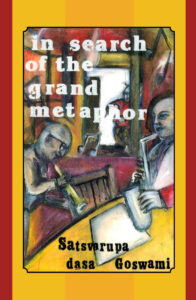
The metaphor is song. Explain it. Yes, particulars may not seem interesting or profound to readers who want structured books.
Wait a minute. Don’t pander to readers or concepts of Art. But Kṛṣṇa conscious criteria are important and must be followed. So, if your little splayed-out life-thoughts are all Kṛṣṇa conscious, then it’s no problem.
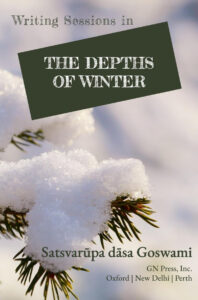
I am near the end of my days. But I do like the company of like-minded souls, especially those who are Kṛṣṇa conscious. Yes! I am prone to Kṛṣṇa consciousness. I have been a disciple of Bhaktivedanta Swami Prabhupāda for maybe almost sixty years. Sometimes I fail him. But I always bounce back and fall at his feet. It is a terrible thing that I sometimes do not have the highest love for him. It is a terrible thing. Actually, however, I never fall away from him. He always comes and catches me and brings me back to his loving arms.

This edition of Satsvarūpa dāsa Goswami’s 1996 timed book, Upstate: Room to Write, is published as part of a legacy project to restore Satsvarūpa Mahārāja’s writings to ‘in print’ status and make them globally available for current and future readers.
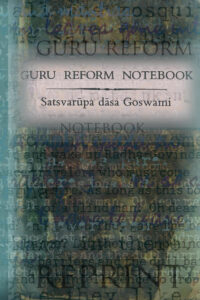
A factual record of the reform and change in ISKCON guru system of mid ’80s.

Readers will find, in the Appendix of this book, scans of a cover letter written by Satsvarūpa Mahārāja to the GN Press typist at the time, along with some of the original handwritten pages of June Bug. Together, these help to illustrate the process used by Mahārāja when writing his books during this period. These were timed books, in the sense that a distinct time period was allotted for the writing, during SDG’s travels as a visiting sannyāsī
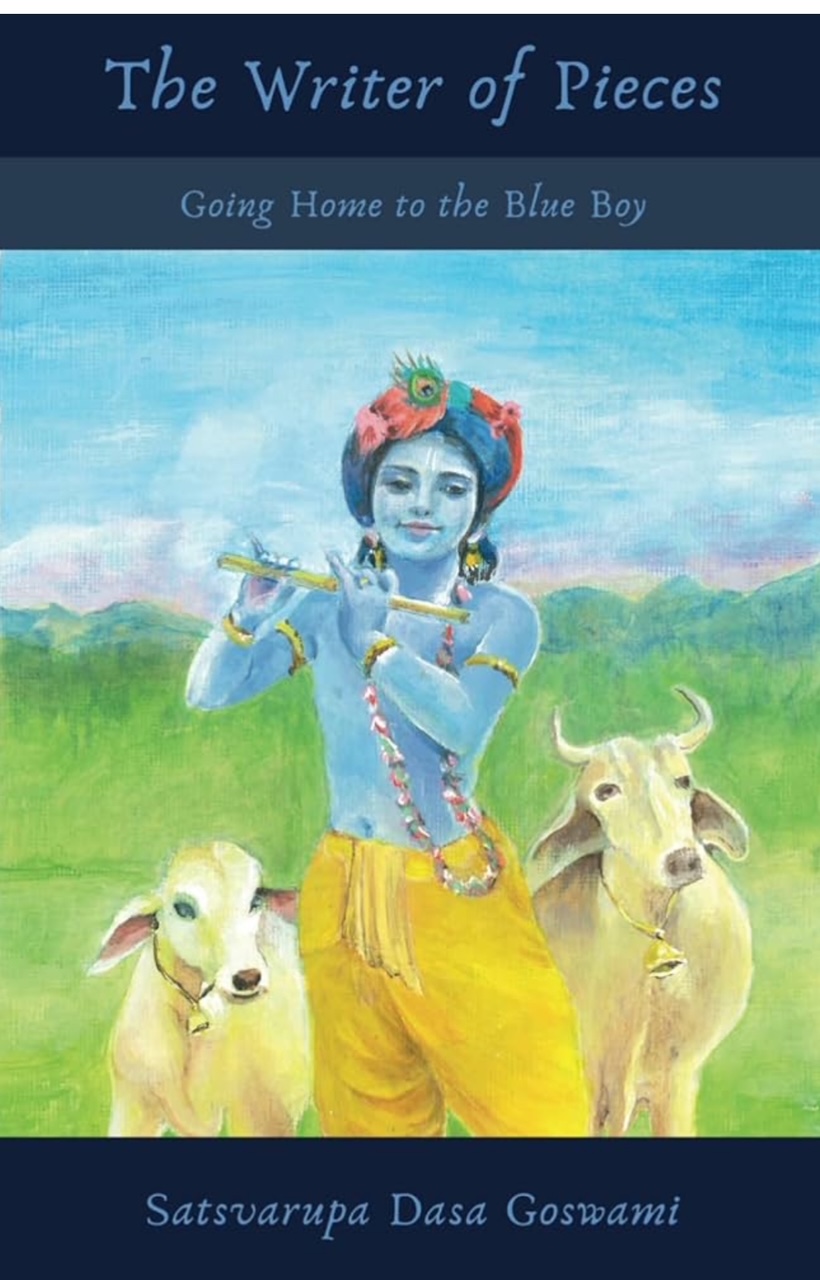
Don’t take my pieces away from me. I need them dearly. My pieces are my prayers to Kṛṣṇa. He wants me to have them, this is my way to love Him. Never take my pieces away.
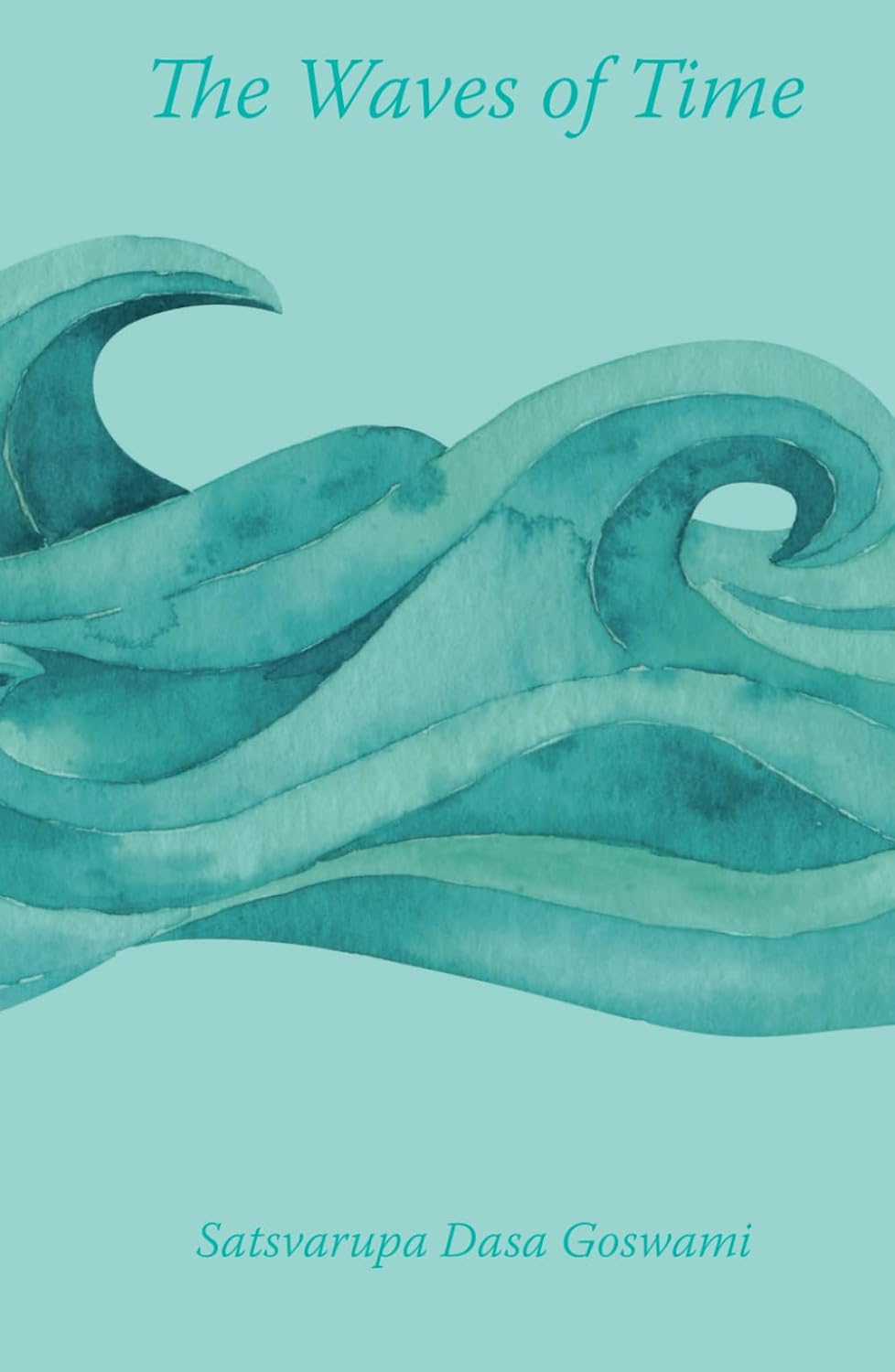
Many planks and sticks, unable to stay together, are carried away by the force of a river’s waves. Similarly, although we are intimately related with friends and family members, we are unable to stay together because of our varied past deeds and the waves of time.

To Śrīla Prabhupāda, who encouraged his devotees (including me) To write articles and books about Kṛṣṇa Consciousness.
I wrote him personally and asked if it was alright for his disciples to write books, Since he, our spiritual master, was already doing that. He wrote back and said that it was certainly alright For us to produce books.

I have a personal story to tell. It is a about a time (January–July 1974) I spent as a personal servant and secretary of my spiritual master, His Divine Grace A.C. Bhaktivedanta Swami Prabhupäda, founder-äcärya of the International Society for Krishna Consciousness. Although I have written extensively about Çréla Prabhupäda, I’ve hesitated to give this account, for fear it would expose me as a poor disciple. But now I’m going ahead, confident that the truth will purify both my readers and myself.

First published by The Gītā-nāgarī Press/GN Press in serialized form in the magazine Among Friends between 1996 and 2001, Best Use of a Bad Bargain is collected here for the first time in this new edition. This volume also contains essays written by Satsvarūpa dāsa Goswami for the occasional periodical, Hope This Meets You in Good Health, between 1994 and 2002, published by the ISKCON Health and Welfare Ministry.

This book has two purposes: to arouse our transcendental feelings of separation from a great personality, Śrīla Prabhupāda, and to encourage all sincere seekers of the Absolute Truth to go forward like an army under the banner of His Divine Grace A.C. Bhaktivedanta Swami Prabhupāda and the Kṛṣṇa consciousness movement.

A single volume collection of the Nimai novels.

Śrīla Prabhupāda was in the disciplic succession from the Brahmā-Mādhva-Gauḍīya sampradāya, the Vaiṣṇavas who advocate pure devotion to God and who understand Kṛṣṇa as the Supreme Personality of Godhead. He always described himself as simply a messenger who carried the paramparā teachings of his spiritual master and Lord Kṛṣṇa.

Dear Srila Prabhupada,
Please accept this or it’s worse than useless.
You have given me spiritual life
and so my time is yours.
You want me to be happy in Krishna consciousness
You want me to spread Krishna consciousness,

This collection of Satsvarūpa dāsa Goswami’s writings is comprised of essays that were originally published in Back to Godhead magazine between 1966 and 1978, and compiled in 1979 by Gita Nagari Press as the volume A Handbook for Kṛṣṇa Consciousness.

This second volume of Satsvarūpa dāsa Goswami’s Back to Godhead essays encompasses the last 11 years of his 20-year tenure as Editor-in-Chief of Back to Godhead magazine. The essays in this book consist mostly of SDG’s ‘Notes from the Editor’ column, which was typically featured towards the end of each issue starting in 1978 and running until Mahārāja retired from his duties as editor in 1989.

This collection of Satsvarupa dasa Goswami’s writings is comprised of essays that were originally published in Back to Godhead magazine between 1991 and 2002, picking up where Volume 2 leaves off. The volume is supplemented by essays about devotional service from issues of Satsvarupa dasa Goswami’s magazine, Among Friends, published in the 1990s.

“This is a different kind of book, written in my old age, observing Kṛṣṇa consciousness and assessing myself. I believe it fits under the category of ‘Literature in pursuance of the Vedic version.’ It is autobiography, from a Western-raised man, who has been transformed into a devotee of Kṛṣṇa by Śrīla Prabhupāda.”
 The Best I Could Do
The Best I Could DoI want to study this evolution of my art, my writing. I want to see what changed from the book In Search of the Grand Metaphor to the next book, The Last Days of the Year.
 a Hare Krishna Man
a Hare Krishna ManIt’s world enlightenment day
And devotees are giving out books
By milk of kindness, read one page
And your life can become perfect.
 Calling Out to Srila Prabhupada: Poems and Prayers
Calling Out to Srila Prabhupada: Poems and PrayersO Prabhupāda, whose purports are wonderfully clear, having been gathered from what was taught by the previous ācāryas and made all new; O Prabhupāda, who is always sober to expose the material illusion and blissful in knowledge of Kṛṣṇa, may we carefully read your Bhaktivedanta purports.

I use free-writing in my devotional service as part of my sādhana. It is a way for me to enter those realms of myself where only honesty matters; free-writing enables me to reach deeper levels of realization by my repeated attempt to “tell the truth quickly.” Free-writing takes me past polished prose. It takes me past literary effect. It takes me past the need to present something and allows me to just get down and say it. From the viewpoint of a writer, this dropping of all pretense is desirable.
 Geaglum Free Write
Geaglum Free WriteThis edition of Satsvarūpa dāsa Goswami’s 1996 timed book, Geaglum Free Write Diary, is published as part of a legacy project to restore Satsvarūpa Mahārāja’s writings to ‘in print’ status and make them globally available for current and future readers.